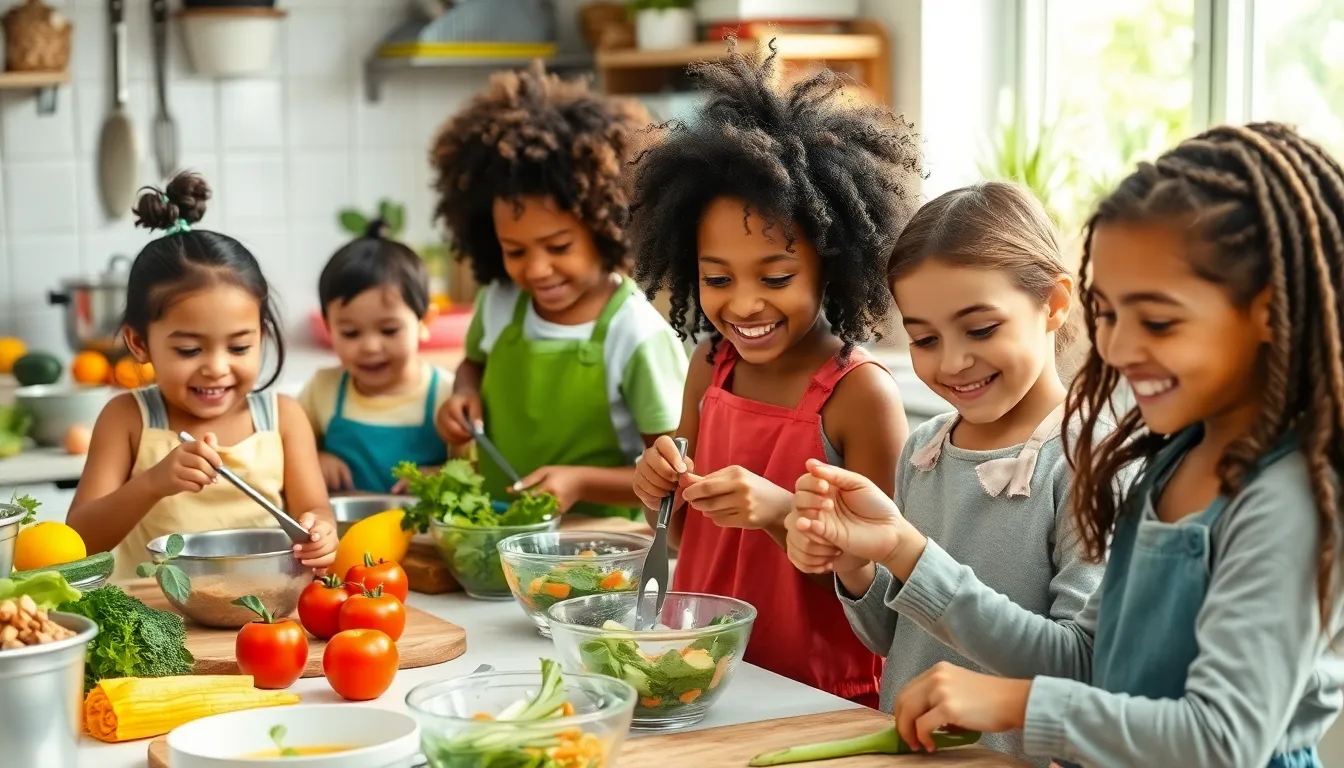Imagine a world where tiny chefs don oversized aprons and wield spatulas like swords. A children’s cooking adventure isn’t just about mixing flour and sugar; it’s about sparking creativity and building confidence in the kitchen. With every chop, stir, and sprinkle, kids embark on a delicious journey that transforms them into culinary explorers.
Table of Contents
ToggleOverview of Childrens Cooking Adventure
Children’s cooking adventures provide unique, engaging experiences that foster growth and exploration. These activities encourage young participants to adopt the roles of chefs, enticing them with hands-on opportunities. While mastering essential cooking skills, kids also enhance their creativity and build confidence.
Learning takes place through various interactive tasks. Sorting ingredients offers a chance to learn about colors and textures. Chopping vegetables, when done safely, develops fine motor skills and instills an understanding of food preparation. Each step allows children to express their tastes and preferences, leading to a sense of ownership over their culinary creations.
Gaining knowledge about different cuisines broadens their cultural awareness. Activities may include tasting unfamiliar dishes or discovering new flavor profiles. Kids gain an appreciation for diverse ingredients and cooking techniques encompassing the globe.
Social interaction plays a crucial role during these adventures. Cooking with peers fosters teamwork and communication skills. They learn to share responsibilities, resolve conflicts, and celebrate each other’s achievements, enhancing group dynamics.
Safety remains a priority in children’s cooking adventures. Age-appropriate tasks ensure that they can participate without risks, while adult supervision helps maintain a secure environment. By focusing on safe practices, kids feel encouraged to explore the kitchen confidently.
Engaging in cooking adventures lays the groundwork for healthy eating habits. Experiencing food preparation firsthand often encourages children to try new foods. Parents may note improved willingness to consume fruits, vegetables, and whole grains in meals, promoting their overall well-being.
Benefits of Cooking for Kids

Cooking adventures offer a variety of benefits for children that extend beyond the kitchen. Engaging in these activities helps kids develop essential skills that carry into everyday life.
Enhancing Life Skills
Life skills receive a significant boost when children participate in cooking activities. Problem-solving emerges as kids navigate recipes, deciding how to adjust ingredients based on availability. Time management becomes apparent as they learn to sequence tasks for efficiency. Culinary tasks also improve fine motor skills through chopping, mixing, and measuring. Social skills flourish during group cooking sessions, where teamwork and communication take center stage. Creativity shines as they experiment with flavors and presentation, fostering their imagination and innovation.
Promoting Healthy Eating
Healthy eating habits take root during cooking adventures. Preparing meals encourages children to explore new ingredients and flavors, increasing their willingness to try unfamiliar foods. Familiarity with food preparation helps them make informed choices about nutrition. Learning about various fruits, vegetables, and whole grains fosters an appreciation for balanced diets. Exposure to diverse cuisines expands their palates, making healthy options more appealing. Involvement in meal preparation lays the groundwork for lifetime healthy eating patterns.
Fun Cooking Activities
Cooking activities offer delightful opportunities for children to explore the culinary world creatively. Engaging in hands-on tasks allows kids to develop various skills while having fun.
Simple Recipes for Beginners
Starting with easy recipes helps children gain confidence in the kitchen. Dishes like fruit skewers, no-bake cookies, and simple salads require minimal ingredients. Recipes designed for beginners enhance excitement as kids mix, measure, and assemble their creations. Using common household items enhances accessibility. These tasks introduce basic cooking techniques, such as slicing, mixing, and garnishing. Children learn to follow instructions while experiencing the rewards of finishing a tasty dish. Encouraging young cooks to decorate their plates fosters creativity and satisfaction in their culinary achievements. As they enjoy their successes, the desire to explore new recipes often increases.
Themed Cooking Challenges
Themed challenges add an element of fun and excitement for kids engaging in culinary exploration. Ideas include international cuisine nights, holiday-themed meals, or color-based cooking games. Each theme inspires creativity and encourages children to learn about various cultures or ingredients. Participants can prepare dishes reflecting their chosen theme, sparking discussions about flavors and traditions. Kids develop teamwork skills while collaborating on these challenges. These activities not only promote cooperation but also elevate excitement through competition. Winning can mean creating the best dish or most creative presentation, which motivates young chefs to express themselves artistically. Activities such as these nurture enthusiasm for cooking and exploration.
Safety in the Kitchen
Cooking can be fun, but safety in the kitchen is crucial for children. Encouraging awareness helps prevent accidents.
Essential Safety Tips
Ensure children understand basic kitchen safety rules. Always wash hands before handling food to prevent contamination. Teach young cooks to handle knives carefully and to cut away from their bodies. Supervision during cooking tasks is vital, especially when using hot surfaces like stoves and ovens. Keep flammable items away from heat sources to reduce fire risks. It’s helpful to establish a “no running” rule in the kitchen for added safety. Having a designated workspace can prevent overcrowding and accidents.
Age-Appropriate Tasks
Assigning age-appropriate tasks enhances safety and builds confidence. Younger children can wash fruits and vegetables, helping them engage with food safely. At this age, they can also measure ingredients, learning basic math skills. Older kids can assist with peeling or stirring under supervision, gradually introducing them to more complex tasks. By involving them in safe cooking activities, they gain a better understanding of kitchen environments. Cooks aged ten and up might start learning how to use kitchen appliances, but supervision remains important. These tasks promote independence while ensuring a safe cooking experience.
Children’s cooking adventures offer a fantastic way to blend fun and learning. These experiences not only nurture creativity but also instill essential life skills that shape young minds. As they chop, mix, and taste, kids gain confidence and develop a sense of ownership over their culinary creations.
Engaging in the kitchen fosters teamwork and communication, creating lasting memories with friends and family. With safety as a priority, children can explore the culinary world while building healthy habits that last a lifetime. Ultimately, these cooking adventures are more than just meals; they’re stepping stones toward a brighter, more confident future.




